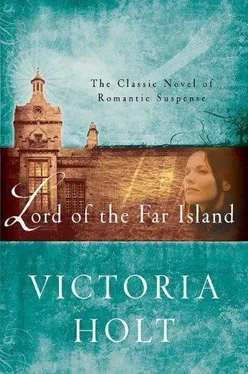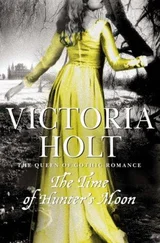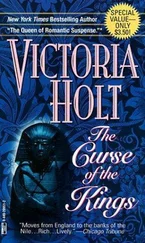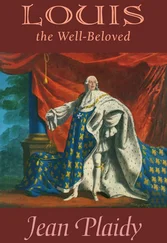Perhaps in the years to come I should get to know him very well. After all, he would be my brother-in-law.
When Philip and I met in the Park I told him about my meeting with Rollo. He was amused.
"He came home from Rome only last night," he said. "Quite unexpectedly. Our mother had written to him about the engagement."
"Was that what brought him home?"
"Oh yes, he had to come at such a time."
"To inspect the bride?"
"He'd met you before. He knows your family well."
"And he looked at the house."
"Yes, as soon as he heard we were contemplating getting this one he wanted to see it. He thinks it's quite a good bargain. He suggests we make an offer for it."
"He doesn't object to our marriage ..."
"Object! Why on earth should he?"
"Well, you're so rich and I have no money at all."
Philip burst out laughing. "What notions you get! As if they care about that. My mother was poor when she married my father and he was already a rich man then."
"She had a title."
"Well, look what you've got. You're beautiful and kind, and kind hearts are more than coronets. You should know that."
"And simple faith than Norman blood. Do I have simple faith?"
"You must have to love me."
He was so gay, jaunty, so sure that life was going to be good. I kept comparing him with his brother. How different they were.
"I think it's marvelous," I said, "the way your family have accepted me. Cousin Agatha is amazed."
"Cousin Agatha is a silly old woman. Forgive me, I know she's your cousin."
"Far removed, as I've told you before, and don't apologize. It gives me a certain gratification to hear this Carrington view."
"Why of course they're delighted. They want me married. They think it will be good for me. And they want some little Carringtons. As for Rollo, he's as pleased as he could be. It solves things, it makes it all so convenient."
"Very convenient," I said. "In fact, you could call this a marriage of convenience."
"It's most convenient for me."
"Still you might have chosen someone in your own set."
"Who could be more so? Whom did I tease and bully in my foolish youth?"
"I think you were teased and bullied by me as I ever was by you."
And so we talked; and I was fond of him; yet there was an uneasy feeling within me. I wasn't in love with him. He was kind; he was affectionate; and he was familiar. But I was suddenly afraid of the future.
I wanted to hear more of Rollo Carrington. Rosie was a good informant by way of her coachman. "Harry says we'll get married next year," she told me. "The head coachman's leaving and he's having his place and that means a nice little mews cottage. Mr. Carrington has promised him. It's a good house to be in. I'll work in the house—it's expected. Harry says it's the best house he's ever been in. Mr. Carrington's away so much and Lady Emily's not one to interfere; and I'll see you now and then, Miss, because you'll be there on and off, I reckon. I can't say I'm well suited here. She's always poking and prying and never satisfied. Cook said if she had the angel Gabriel in her kitchen she'd be finding fault. It's different there, Harry says. They don't interfere. They don't want to keep reminding you you're a servant. They don't think of it. Mr. Carrington's too busy with what the Government's doing and Lady Emily's not the kind."
"What about the son?"
"Mr. Philip. Why, Miss, you know more about him than anyone else."
"I mean Mr. Rollo."
"Him. Oh, he's another like his father. All business, so they say."
"He did marry though."
"Oh, that!"
"Rosie, did you ever see her?"
Rosie was silent for a few moments. Then she said: "Harry did. He drove them once or twice."
"What is she like?"
"Harry couldn't say. He never heard her speak. She was just in the carriage with him."
"Did he speak to her?"
"Harry never heard him. Like two deaf-mutes, they were. Not that Harry drove them much. Then she went away and Harry never drove her again."
"What did she look like?"
"I've asked Harry that, Miss Ellen, but you know what men are. They never notice. He couldn't say. Just that there was something sad about her. He did say she was like a gray ghost. She was always dressed in gray."
"A sad gray ghost," I echoed.
"You're getting your fancies again, Miss Ellen. Don't I remember what a one you used to be. Nose into everything and what you couldn't find out you made up. I know you, Miss Ellen."
One of the maids came into the room.
"Now, Bess," said Rosie, "what do you want?"
"I only came to tell you Janet's looking for you."
"Tell her I'll be along soon. I'm engaged with Miss Ellen."
When the girl had gone she said: "These youngsters... they listen. They hear more than's good for them."
I wondered then what I was doing gossiping with one of the servants in my old belowstairs manner. I must remember to mend my ways, now that I was to be a Carrington.
I said a little abruptly: "Well, I won't keep you, Rose."
Lady Emily was a good informant. Strangely enough, she liked me, which was very comforting, since she could hardly have been delighted by my poverty. She encouraged me to visit her frequently and I often called at the house. She did a kind of tatting quite expertly and it was fascinating to watch her fingers working in an efficient manner while her mind wandered on inconsequentially.
She liked me to sit beside her while she talked.
"I always wanted a daughter," she told me. "I hope you'll have some girls. Of course they want boys... and the first should be one, I suppose, but girls are very charming. I always wanted a girl or two."
From her conversation I learned far more about the Carringtons than I had known before.
The house in Sussex had come to her. She had been an only child and Trentham Towers had been the home of her family for five centuries.
"It was a pity there were no boys... the title went to a cousin, you know. But I kept the house. I was so glad. At one time it seemed... and then I had boys, two boys and no girls. Isn't that strange? My parents longed for a boy and got me ...I would have liked a daughter and had two boys. You are my new daughter, Ellen. I think we shall be fond of each other. You're a bright girl and you and Philip are so young... ."
"Perhaps you think we are too young," I said.
"I was seventeen when I married. It was a good match. We were so poor. Trentham was falling to pieces. Josiah has done so much for it. I used to shiver in my bedroom. So cold in the winter. Now we are in this house in the winter and we go there in the summer.
So pleasant; and of course the servants ... we had our faithful ones. Poor souls, they rarely were paid. So good; and the roof was a constant anxiety.... They were always talking of the fabric of the building. Such a strange term! And then there was Josiah. Of course it was not a family like ours... but so rich. He was ten years older than I. You wouldn't believe it, would you? The Carringtons wear well. It's all that energy. They are always doing something that's vital to something, some country, some business and of course to themselves. It keeps them alert and to be alert is to be young, they say. I was never very alert, but I did marry Josiah and that was the end of Trentham's troubles. I haven't heard the fabric mentioned for years. Josiah's people... builders and suchlike... take care of that. As soon as the fabric does what it shouldn't, it is rectified. Everything changed on the day I married Josiah. My parents were delighted with the match, and Rollo was born a year after our marriage. Perhaps this time next year, dear... ."
"I do hope I'm going to produce these babies," I said.
"You will, because you're in love. I believe that's very important. Philip adores you. He always did. He was always talking about you, you know."
Читать дальше










